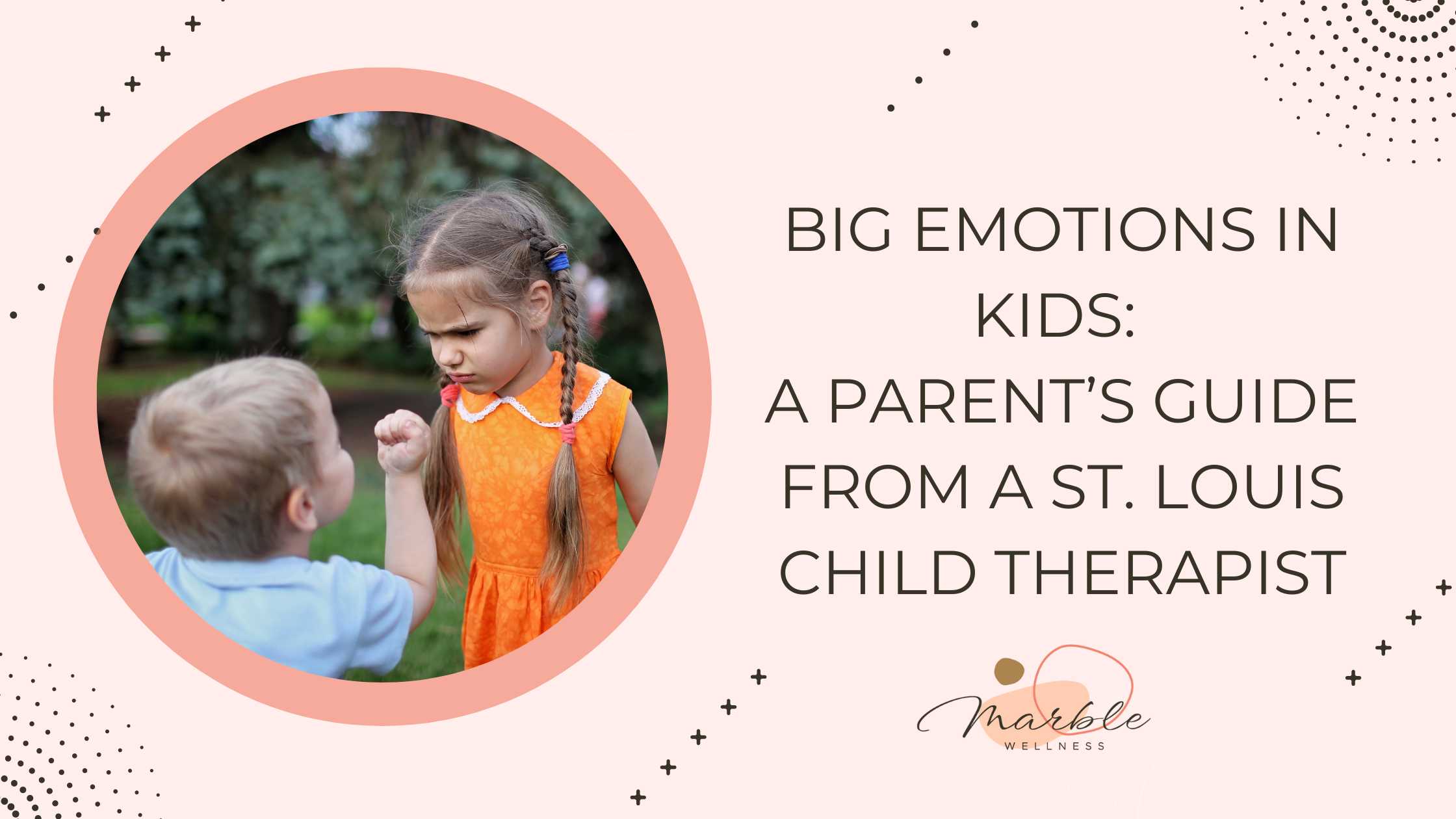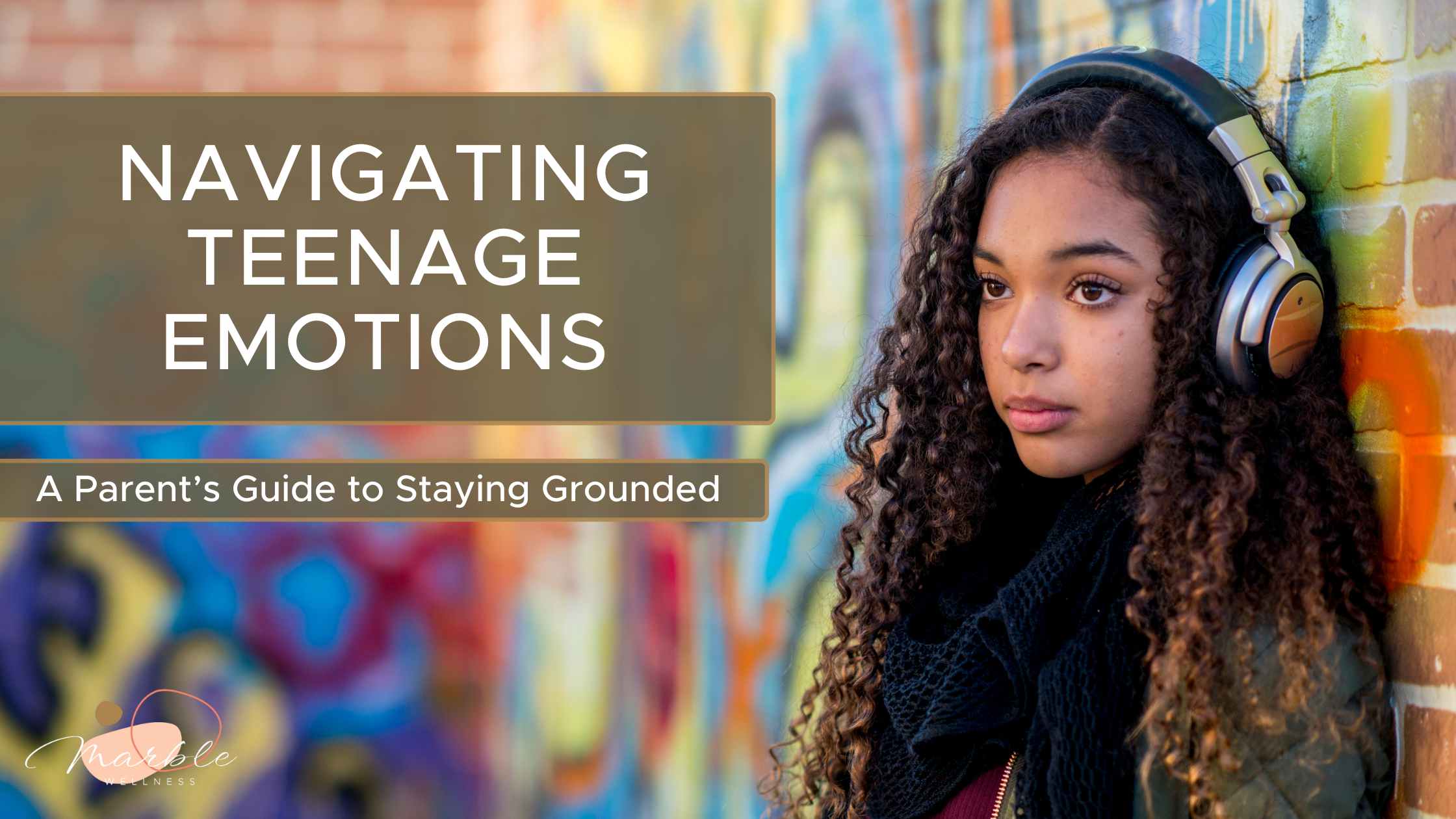Hello, parents and caregivers! If you’ve ever felt like your child’s emotions are a rollercoaster ride that you didn’t sign up for, you’re not alone! With a specialty in child therapy, our team of STL therapists here at Marble Wellness often hear parents talk about how their child feels “big feelings” and how exhausting it can be to navigate these emotional highs and lows.
The questions parents ask—either out loud or between the lines can include the following:
- Why do kids feel such big emotions?
- Is it a bad thing?
- Am I doing something wrong as a parent?
- And most importantly, how can I help my child?
These are all great questions, and we want to explore them with you!
Why Do Kids Feel Such Big Emotions?
First off, it’s important to understand that feeling big emotions is a normal part of child development. Children are still learning how to process and express their feelings. Their brains are not yet fully developed, especially the parts that help with impulse control and emotional regulation. This means that when they feel something, they often feel it intensely and express it loudly.
Big emotions can be triggered by a variety of factors. Changes in routine, unmet needs, frustration, fatigue, and even hunger can set off a big emotional reaction. Think about it: if you’re tired and hungry, you might get a bit cranky, too! For children, these feelings are even more intense because they haven’t yet developed the coping skills that adults have.
Is It Bad for Kids to Have Big Emotions?
Absolutely not! Having big emotions is not a bad thing. It’s a natural part of growing up and learning about the world. Emotions, even the big and scary ones, are important because they help children understand their experiences and communicate their needs. The key is helping them learn how to manage these emotions in a healthy way.
Are You Doing Something Wrong as a Parent?
Let’s get one thing straight: if your child has big emotions, it does not mean you’re doing something wrong as a parent. Parenting is tough, and every child is different. Some kids are naturally more emotional and sensitive than others. What’s important is how you respond to your child’s big feelings. Your support and guidance can make a huge difference in helping them navigate their emotions.
How Can You Help Your Child with Big Emotions?
So, what can you do when your child is having a big emotional moment? Here are some strategies to help you and your child manage those intense feelings:
Stay Calm
Your child looks to you for cues on how to react. Staying calm during their emotional outburst can help them feel more secure. Take deep breaths and try to keep your voice steady and soothing.
Validate Your Child’s Feelings
Let your child know that it’s okay to feel what they’re feeling. You might say, “I see you’re really upset right now, and that’s okay.” This helps them feel understood and less alone in their emotions.
Provide Comfort and Reassurance
Sometimes, a hug or gentle words of reassurance can go a long way. Let your child know you’re there for them and that you’ll help them through their big feelings.
Teach Children Emotional Regulation Skills
Help your child learn ways to manage their emotions. This could include deep breathing exercises, counting to ten, or finding a quiet space to calm down. Over time, these skills can become valuable tools for them to use on their own.
Set Boundaries
While it’s important to validate emotions, it’s also crucial to set clear boundaries. Let your child know that it’s okay to be angry, but it’s not okay to hit or throw things. Consistent boundaries help them understand acceptable ways to express their feelings.
Model Healthy Emotional Expression
Show your child how you manage your own emotions. Talk about your feelings and demonstrate healthy coping strategies. Children learn a lot by watching their parents.
How Can Therapy Help Children Manage Emotions?
If your child’s big emotions are causing significant stress or impacting their daily life, it might be helpful to seek support from a child therapist. But what exactly does a child therapist do?
1. Identify Triggers: A therapist can help identify specific triggers that cause your child’s big emotional reactions. Understanding these triggers is the first step in managing them.
2. Develop Coping Strategies: Therapists teach children effective ways to cope with their emotions. This might include mindfulness exercises, relaxation techniques, or creative outlets like drawing or playing.
3. Improve Communication Skills: Therapy can help children develop better communication skills so they can express their feelings more effectively. This reduces frustration and helps them feel heard.
4. Build Emotional Intelligence: Therapists work with children to build their emotional intelligence. This means helping them understand their own emotions, recognize emotions in others, and develop empathy and problem-solving skills.
What Might a Therapist Recommend to Parents?
Therapists often provide guidance to parents on how to support their child at home. Some common recommendations include:
Consistent Routines: Having a predictable daily routine can help children feel more secure and reduce anxiety.
Positive Reinforcement: Praise and reward your child for expressing their emotions in healthy ways. Positive reinforcement encourages them to continue using these skills.
Open Communication: Keep the lines of communication open with your child. Encourage them to talk about their feelings and listen without judgment.
Self-Care for Parents: Taking care of your own emotional well-being as a parent is crucial. When you’re feeling calm and supported, you’re better able to support your child.
Big emotions in kids can be challenging, but they are also an important part of their development. By understanding why these emotions happen and how to respond, you can help your child learn to manage their feelings in a healthy way. And remember, seeking support from a child therapist is a proactive step that can benefit both your child and your family.
So next time your child has a big emotional moment, take a deep breath and know that you’re equipped to handle it. With patience, understanding, and a little bit of professional guidance, you can help your child navigate their big feelings and develop into a resilient, emotionally intelligent individual.
Looking for Child Therapy in St. Louis?
If you live in St. Louis and want to start your child in therapy during the summer, we are here to help. With expert therapists for children and adults throughout the St. Louis area, we can surely find a convenient way for your child to get the help they deserve. In fact, with online therapy in Missouri, you don’t even have to leave your home. When you’re ready, we’re ready to help.
Contact Us!

Additional Counseling Services at Marble Wellness in St. Louis, MO and Chicago, IL
Counseling services are designed to help set you on a path of living a more fulfilled, calm, and happy life.
St. Louis
Our St. Louis team of therapists has a variety of training backgrounds and areas of expertise. We specialize in anxiety, depression, grief, chronic illness, therapy for men, couples, and maternal overwhelm. Our practice also helps new moms with various postpartum concerns, moms in the thick of parenting, and moms with teens. We can also chat from wherever you are in the state with online therapy in Missouri and online therapy in Illinois. No matter where you are in your journey, we would love to support you.
Chicago
Our Chicago team of therapists offers a wide range of mental health services to help our clients through the different challenges and hurdles in their lives. In addition to anxiety, depression, grief, therapy for men, and maternal overwhelm, we specialize in professional burnout, therapy for breakups, and love partnering with working moms.



